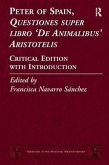In modern linguistics one usually differentiates between content words or syncategorematic words and function words or categorematic words. But most people do not know that this differentiation does not have its roots in modern times. In fact it is one of the achievements of the Middle Ages. The tendency to classify words according their function in a sentence and as operators began to develop around the middle of the 12th century. Its probably most productive form was reached in tracts on syncategorematic words, which multiplied in the 13th century and constituted alongside the doctrine of the properties of terms the second part of logic proper in the Middle Ages. The arguably most important tract of this kind is the "Syncategoremata" of the English logician William of Sherwood. This book is mainly a commentary on this treatise. Furthermore it gives a survey of the history of syncategorematic words and of its study.








